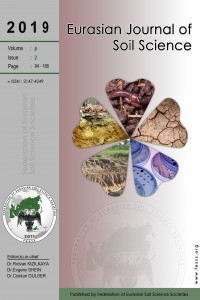
Eurasian Journal of Soil Science
Yazarlar: Ana Balla KOVÁCS, Rita KREMPER, İda KİNCSES, Anita SZABÓ
Konular:-
DOI:10.18393/ejss.79233
Anahtar Kelimeler:Nitrogfertilizer,Food waste compost,Bacterial fertilizer,Carrot,Soil,Nutrients
Özet: This paper reports a greenhouse study to compare the effects of food waste compost, bacterial fertilizer and their combination with the effect of mineral fertilizer on yield of carrot and the available nutrient content of soils. The study was conducted on calcareous chernozem and acidic sandy soils and consisted of 8 treatments in a randomized complete block design with four replications. The NH4NO3 resulted in reduced growing of carrot plant in sandy soil, and the treatment effect of mineral fertilizer was not observed significantly in chernozem soil. Sandy soil showed higher response of growth of carrot to food waste compost fertilization than chernozem soil. Sole application of EM-1 bacterial fertilizer did not have marked effect on yield parameters and sizes of roots. When EM-1 bacterial fertilizer was applied together with ammonium-nitrate or with compost in chernozem soil, the weights of roots and the sizes of roots in some cases became higher compared to the values of appropriate treatments without inoculation. In sandy soil the diameter of roots slightly increased when EM-1 bacterial fertilizer was applied with ammonium-nitrate and with ammonium-nitrate+compost combination compared to appropriate treatment without inoculation. In chernozem soil the maximum weights and sizes of roots were achieved with the combined treatment of ammonium-nitrate+compost+EM-1 bacterial fertilizer and in sandy soil with compost treatment. Our results of soluble nitrogen content of soils are in good agreement with yield parameters of carrot. Results suggest that food waste compost could be a good substitute for mineral fertilizer application in carrot production mainly in sandy soil. EM-1 bacterial fertilizer did not cause marked effect on yield and yield parameters of carrot plant, but its combination with other fertilizers promises a little bit higher yield or plant available nutrient in the soil. These effects do not clear exactly, so further studies are needed.